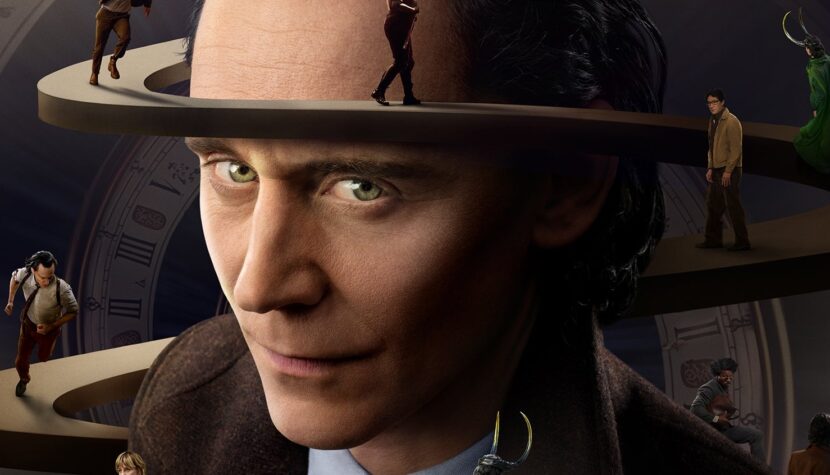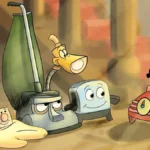LOKI – SEASON 2. A Green Light in the Dark Tunnel of the MCU [REVIEW]

Loki may not be the most spectacular production in the MCU, but it offers something entirely different, elevating it to a completely different level – a focus on its characters and constantly building tension. I see a significant paradox here – there’s no typical Marvel fluff to be found, and yet, the story of the transformation of the Prince of Asgard is one of the best, most consistent, thoughtful, and visually polished things Marvel has produced. And I’m not just talking about universe-related series, but also movies. Interestingly (and somewhat sadly), in the perspective of the total narrative chaos of Marvel, Loki only highlights the problems of the entire MCU. A more symbolic correspondence duel between two productions of the same universe, both premiering on the same day, could not have been created. The streaming platform series, which few counted on just two years ago, outshone a potential cinematic hit and became a benchmark for quality, a guide for the further development of the entire universe. That’s quite something.
The second season begins exactly where and when the previous one ended. However, it focuses more on the characters, attempting to prevent the impending TVA apocalypse and the collapse of all parallel worlds. The issue of the multiverse is explored, with its complexities understood through the character Uroboros (Ke Huy-Quan). Nevertheless, at the center of everything is Loki grappling with a time slip. The God of Mischief tries to find a way to stop the inevitable temporal implosion. And at this moment, we reach the essence of the entire series. I don’t know if, post-Endgame, aside from Rocket, there is another character arc in Marvel as well-drawn as Loki’s. It’s a complete and beautiful journey, a poetic closure that encapsulates his entire story. It transcends the series yet ties it together remarkably consistently. Think about it – Loki, the biggest egotist among all the characters, morally ambiguous antihero, must realize that fulfilling his destiny involves complete rejection of his selfishness. This is beautifully portrayed at the narrative level as well, as the desire to be the center of attention, which characterized him, is reversed by giving space to friends. The creators never forget about Mobius, Sylvie, He Who Remains, and the rest of his close associates. Their stories also have a beginning and an end. In fact, they serve as a springboard for an impossible decision. This way, the God of Deception becomes someone currently evoking the most emotions in the entire multiverse. Loki travels through universes, different timelines, but above all, into himself. And his last mischief, the finale of the journey he has undertaken, is simply a screenwriting masterpiece. Tom Hiddleston became one with his character and delivered great acting.

Not that there aren’t some cracks throughout the entire second season. The middle episodes, in the overall perspective, could be easily trimmed without harm to the plot. Ultimately, I was disappointed by the slight squandering of the ominous potential of Miss Minutes or He Who Remains. Despite all the twists around Jonathan Majors, the actor showcased a range of possibilities in the series. His Victor Timely and Kang are like two different characters, and the latter had the potential to be a true badass. However, it seems the creators had a plan for his removal from the beginning, as they cleverly wrote him out.
Related:
Loki’s status in the current state of the MCU is best illustrated by comparing it to Andor and its quality in the context of other productions from the Star Wars universe. Another comparison that involuntarily came to mind during the second season, especially the finale, was Netflix’s Dark. However, despite these suggestions, Loki remains something unique. It is strongly poetic, patiently constructed, and packed with subtle references to the mythology of the entire world. We have Sisyphean work, Uroboros, or the tree of life. The season has its better and weaker moments, but I don’t know if the two seasons could have been better combined into one extraordinary whole. Loki previously dealt new, very significant cards in the construction of a multiverse-based world. It did so meticulously and intricately, almost embarrassing the viewer. All of this turned out to be a trick, a device to tell problems of existential and essential nature from Loki’s perspective. Despite all its virtues, the series stands at a surprisingly high artistic level. Especially in the context of previous productions, including films. Visually, it is probably currently the most characteristic, authorial production in the MCU – maintaining the color scheme and tone of what we got in the first season, and even raising the bar slightly in terms of editing and cinematographic madness.
The second season of Loki is extraordinary, especially in terms of understanding and developing the character. Few viewers would have bet a dollar that the last hope of many MCU fans for the return of the universe to the right tracks would rest on the shoulders of the eternal loser. Meanwhile, this happens both on the level of this metaphor and the actual plot events. Fullness. It is an incredibly complex yet obvious story about understanding oneself, renouncing egoism, and sacrifice. A single frame with a characteristic color palette, retrofuturistic gadgets, is enough to recognize this series. Compared to the bland MCU Phase IV productions, it looks like a small masterpiece. And for the last episode, directors Aaron Moorhead and Justin Benson, composer Natalie Holt, and the scriptwriters Eric Martin, Katharyn Blair; Kasra Farahani; Jason O’Leary deserve a big salute.”





